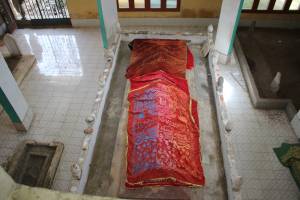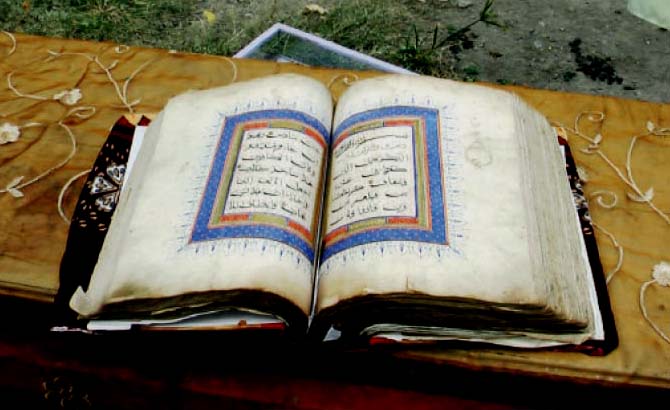Hafiz-e-Alpuri was a Sufi poet and scholar, but he was also a good calligrapher. Nearly over 300 years ago he wrote a manuscript of the Holy Quran in a calligraphic design but the work is so fine and intricate that it appears to be done by computer graphics.
Alpuri was a well-known Pashtu Sufi poet. His full name was Abdul Samad, and according to his descendant – a seventh-generation grandson Hamid-ur-Rehman – Hafiz Baba was born in 1670 Hijri at Utmanzai area of Charsadda. From here he migrated to Saidu Sharif, Swat, where he studied religious Islamic education and became a scholar.
After gaining knowledge at Azi Khel Seminary he finally migrated to Shangla Alpuri (Halfori).
At Shangla Alpuri, the Sufi-poet set up a seminary where he taught the Holy Quran to his pupils.
Says one of his grandsons Fazal Mawjood, who is a Primary School Teacher “He was a poet of the caliber of Rahman Baba and he is famous for his collection of poetry called Dewan-e-Hafiz Alpuri.”
The poet’s title Hafiz-e-Alpuri was derived from his learning of the Quran by heart and the latter part because he belonged to the village Alpuri – a beautiful valley in District Shangla, unknown to many.
Mawjood informs that the sufi poet had two sons Aulia Baba and Waisal Baba. The only descendants are from the line of Waisal Baba, since Aulia Baba died unmarried.
Hafiz Alpuri died at the grand age of 110 years in the year 1790 AD. His shrine is situated at Koz Alpuri near the district headquarters of Shangla, but even today the valley has not forgotten his name. There are many literary circles in the name of Hafiz-e-Alpuri those organize literary session in the various parts of Khyber Pakhtunkhwa.
Baaz pa Jala ki Cha nady Pejandaly,
Qadar neshta da Hafiz pa Alpuri ki
The eagle did not recognize in the nest,
there is no value of the Hafiz in Alpuri
This is most common verses of his poetry in the KP province uttered by the Hafiz-e-Alpuri as complaint from the locals at that time.
Tucked away mysteriously though, is a miraculous preservation of the Holy Quran written by Hafiz Alpuri over 300 years ago, but still in its original state, beautiful and intact. The credit goes to the descendants of the Sufi poet. Each generation took great care in keeping it safely and it remains well kept at his ‘grandson’ Fazal Elahi’s home.
On the front page of the Holy Book is a written dedication by Hafiz Baba to his son Waisal.
“It is a masterful piece of work, so ancient and painted by hand,” says Muhammad Sharif, a calligrapher. “No wonder he is still remembered.”
He says that the Arabic fonts Sulus and Ruqa which are a few common script of the Arabic language, beside it, he had used the Gold water, Saffron, Musk, mixture of rice and Sugar and other stuff as inks besides the different colors, while the paper is also manually prepared from the tree.
“What is a little puzzling is why the Sufi poet left the translation of the Holy Book after only the fourth verse, but continued translating along his illustrations in the Persian language,” says Sharif. “We do not know but we can only guess. Maybe he suffered from eye sight issues, or passed away before he could complete it.” Sharif has himself illustrated the holy Quran in calligraphy.
In the entire manuscript the name ALLAH has been written with gold ink, while he had also made various points in the initial pages pointing out specific verses. There are even pages of watermarks designed by him displaying his extraordinary painting skills.
Mawjood, the Sufi’s other ‘grandson’ says that they have kept the Holy Quran safe so far, but the task was challenging. A glass box was made especially for its preservation and was provided to them in 2003 by the Hafiz-e-Alpuri literary circle.
“in 1980 the Pakhtu Academy in Peshawar had requested my father the late Ismail Khan to give them access to the holy Quran and they offered to pay him for it,” he remembers. “But my father refused especially because of the dedication from Hafiz Baba to his son – in whose direct lineage we are. It must be taken care of and stay within the family.”
As he himself was a poet and a learned man, even today, Hafiz Baba’s family mostly comprises academics – both teachers and religious scholars. They are spread out all over the valley.
“Hafiz-i-Alpuri was among the very few philosophical poets,” says Professor Abasin Yousufzai. “After Rehman Baba, Ali Baba in the Tasavuf (perfection) poetry Hafiz-I-Alpuri work was best too,”
He says in all the poetry by Hafiz baba, Persian and Arabic words are used because of which some people have difficulty in understanding especially his verses revolving around Tasavuf or Sufism. “Most of his poetry is about advice, culture, and his lessons in ethics and morality for society are amazing and admirable indeed,” says the Professor. “Moreover in his poetry he has shared his life experience and teachings for common people for a good and better life.”

Professor Atta ur Rehman, chairman of the Pakhtu department at Jehanzeb College Swat, says Hafiz Baba had also used local language words in his poetry collection, and mostly wrote about spirituality and philosophy.
“Hafiz Baba’s name is among the names of the few Sufi poets of Pashtu of both Khyber Pakhtunkhwa and Afghanistan regions,” he explained. “Senior poet Sher Afzal Khan has even written a manuscript titled (Andaleeb-e-Swat) about Hafiz Baba Alpuri, and in his Pakhtu Shair Adab, he also describes the sufi poet.”
Abdul Haye Habibi, a senior Pashtu poet from Afghanistan had said in his poetry book article that Hafiz Baba was alive the King Taimor Bacha era.
Hafiz-I-Alpuri grands sons demanded of the government to name the Alpuri degree college on his sufi poet name and also appoint staff at his shrine.
Video Documentar Hafiz-I-Alpuri
https://www.youtube.com/watch?v=RL6TZFw81rI








